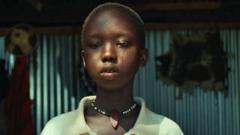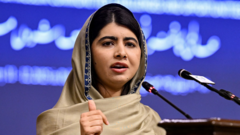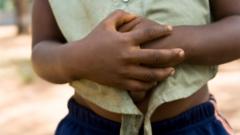Fifteen-year-old Michelle Lemuya Ikeny stars in "Nawi," a poignant narrative reflecting real-life challenges faced by girls in rural Turkana, Kenya, where child marriage prevalence remains alarmingly high.
Teenage Actress Challenges Child Marriage in Groundbreaking Film

Teenage Actress Challenges Child Marriage in Groundbreaking Film
A powerful new film highlights the struggle against child marriage in Kenya, positioning its teenage star as a voice for change.
In a groundbreaking role, Michelle Lemuya Ikeny champions the fight against child marriage through her performance in "Nawi," a coming-of-age film that reflects the stark realities faced by young girls in her community of Turkana, Kenya. Michelle, just 15 and deeply committed to her role, portrays a 13-year-old girl named Nawi who is forced into marriage with an older man after excelling in her exams. As she shares her story, Michelle hopes to ignite crucial conversations around the issue: “So many of my friends had to leave school after being married off. It’s important to talk about it," she expresses passionately.
"Nawi" is steeped in authenticity, as Michelle draws from her own experiences and the lives of those around her. The film captures the dire circumstances of child marriages prevalent in Turkana, where the United Nations reports that one in four girls is married before the age of 18. The narrative takes a daring turn when Nawi, upon learning of her impending marriage for livestock, cleverly fakes her virginity to escape, ultimately pursuing her dream of education in Nairobi.
Written by Milcah Cherotich, who draws parallels from her childhood experiences of growing up in Turkana, the film's foundation rests on personal stories, including Cherotich's own sister's forced marriage at 14. Cherotich candidly opens up about the emotional impact: “She ended up living a life not of her choosing. I wanted to make a difference.”
Responses to the film have been mixed; Cherotich anticipates backlash in her community given its controversial subject matter. However, one heartfelt reaction from her uncle, an advocate for child marriage, illustrates the film’s potential to change perceptions. “His eyes were wet after watching the film. That’s when I realized the power of storytelling,” she recounts.
While child marriage remains a global epidemic, with one in three girls at risk in sub-Saharan Africa, Michelle believes that "Nawi" can serve as a beacon of hope and awareness. The film has garnered various accolades, including Kenya’s submission for the Oscars, and is set for an international release to broaden its reach.
Efforts to further the film's message include free screenings in local communities, and the establishment of a new school where 300 girls are enrolled, highlighting a collective push for change and education in the region. Michelle succinctly states, “Every girl should have the chance to dream. When someone takes that away, it’s the worst feeling.” As the film makes its way to audiences globally, both Michelle and Cherotich highlight the urgent need for empowering conversations around child rights and the importance of education for girls.
"Nawi" is steeped in authenticity, as Michelle draws from her own experiences and the lives of those around her. The film captures the dire circumstances of child marriages prevalent in Turkana, where the United Nations reports that one in four girls is married before the age of 18. The narrative takes a daring turn when Nawi, upon learning of her impending marriage for livestock, cleverly fakes her virginity to escape, ultimately pursuing her dream of education in Nairobi.
Written by Milcah Cherotich, who draws parallels from her childhood experiences of growing up in Turkana, the film's foundation rests on personal stories, including Cherotich's own sister's forced marriage at 14. Cherotich candidly opens up about the emotional impact: “She ended up living a life not of her choosing. I wanted to make a difference.”
Responses to the film have been mixed; Cherotich anticipates backlash in her community given its controversial subject matter. However, one heartfelt reaction from her uncle, an advocate for child marriage, illustrates the film’s potential to change perceptions. “His eyes were wet after watching the film. That’s when I realized the power of storytelling,” she recounts.
While child marriage remains a global epidemic, with one in three girls at risk in sub-Saharan Africa, Michelle believes that "Nawi" can serve as a beacon of hope and awareness. The film has garnered various accolades, including Kenya’s submission for the Oscars, and is set for an international release to broaden its reach.
Efforts to further the film's message include free screenings in local communities, and the establishment of a new school where 300 girls are enrolled, highlighting a collective push for change and education in the region. Michelle succinctly states, “Every girl should have the chance to dream. When someone takes that away, it’s the worst feeling.” As the film makes its way to audiences globally, both Michelle and Cherotich highlight the urgent need for empowering conversations around child rights and the importance of education for girls.




















